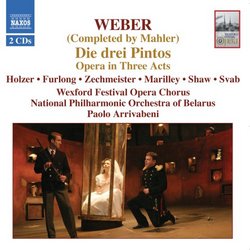Curiosity with an unknown cast
Alan Montgomery | Oberlin, Oh USA | 10/26/2004
(3 out of 5 stars)
"Several years ago, RCA issued a recording of Die Drie Pintos with a surprisingly high-profile cast. Jeannette Scovotti, Kurt Moll, Franz Grundheber and Werner Hollweg (if memory serves me right) were A-1, and the recording was very good. It is no longer available.
This recording is not in that class, but it is very good, once you get past the thunderous stage noises. This is a "live" recording. As always with Naxos, no text or translation. In a work of this rarity, the sketchy synopsis is just not enough. In following the score, I found one repeated section omitted, but otherwise the performance was complete. (I won't name the singers, because they are unknown, but will give character names instead.) The Don Pantaleone has sung Gurnemanz in other theaters, and his initial address in Act two made me afraid he would linger throughout the entire score. But he finally picked up steam. The Don Pintos was good but only so-so in accuracy. Don Gomez and Don Gaston were both wonderful, if unknown, tenors. Though differentiated nicely in timbres, they were able to give stellar performances of their difficult music. Ambrosio is asked to sing a good deal in falsetto, and this Ambrosio couldn't muster much diction when he did, but in his ariette in Act three, instead of singing in falsetto, he simply soared up to a high B! three times. It negated the man versus woman aspect of the aria, but it is quite exciting. The Donna Clarissa and her maid Laura take a while to warm up. Their first music is sung heavily, but once they do get warmed up, they succeed very well, Laura's coloratura mezzo sailing through some pretty tough music very well.
The recording, in additional to capturing the ambience of a live performance, captures too many foot stomps and other stage noises. The orchestra is a little too recessed to hear Mahler's lovely orchestration clearly. I remember hearing the RCA recording and thinking how Mahleresque the orchestral palate was. That cannot happen here.
Still, the fun of the piece comes through, with good diction and a good sense of pace. If only we could follow the text!! I know that takes up paper and takes some expense, but in a work as unknown as this, the synopsis just won't suffice.
4 stars for the performance, 2 stars for the engineering and the lack of text."
'Mahler's Only Opera?'
J Scott Morrison | Middlebury VT, USA | 01/09/2005
(3 out of 5 stars)
"This review's title is that used by this CD's booklet-note writer, Michael Kennedy, and is apt because this unfinished opera by Carl Maria von Weber, begun in 1820 but dropped in favor of work on 'Euryanthe,' was indeed completed by Gustav Mahler in 1887 and premièred in Leipzig (where Mahler was Artur Nikisch's assistant) with Mahler at the helm in early 1888. It was initially successful but dropped out of sight after only a few years. Any current interest in this opera almost surely derives from the today's feverish interest in anything to do with Mahler. It has been recorded before much more successfully in 1976 with a cast that included Lucia Popp, Werner Hollweg, Hermann Prey and Kurt Moll under Gary Bertini, on the RCA label. That recording is no longer available, alas, but copies could probably be found with a diligent search.
This is a live recording from a production of the Wexford Festival, in Ireland, which specializes in mounting rare and unusual operas--I recently reviewed their nice production, in its original Czech, of Jaromir Weinberger's 'Svanda Dudák' ('Schwanda the Bagpiper'). The present production is a merely OK performance, though, I'm afraid. The singers in general are a notch or two below world class and the orchestra sounds underpowered. There are intrusive stage sounds. Further, there is no libretto included, although there is a fairly good synopsis in the booklet.
As to Mahler's involvement in completing the opera, Kennedy's booklet notes are very helpful. In brief, Weber sketched only seven of the projected seventeen numbers and never came back to it. After his death his wife sent them to Meyerbeer to see if he could complete it, but he returned them to the family in 1847. Weber's grandson, Carl, gave them to Mahler who agreed to use the sketches as the basis for his own completion; Carl set about revising the fairly inept existing libretto. Mahler originally thought to finish Acts I and II and have Act III spoken, but then changed his mind. His final version consists of 21 numbers. He used all of Weber's original numbers but not in their original positions and then supplemented them with little-known pieces by Weber which he arranged and rescored. He wrote a completely new entr'acte (which sounds for all the world like original Weber to my ears although there are perhaps some Mahlerian orchestration fingerprints here and there). Mahler's work is essentially undetectable to any but musicians immersed in the styles of both Weber and Mahler. If Mahler's notion was to leave no significant personal traces on the work, he certainly succeeded.
Finally, I would have to say that if a musiclover really wants to hear a performance of this comic opera, they would do well first to try to find a copy of the 1970s recording. Otherwise, this one will do, at least in terms of one being able to hear what Weber and Mahler came up with.
CD1=39:07
CD2=75:15
J Scott Morrison"


 Track Listings (7) - Disc #1
Track Listings (7) - Disc #1